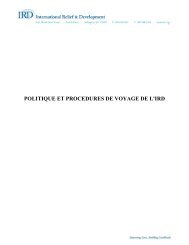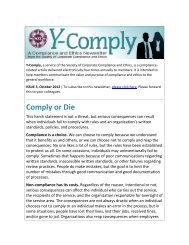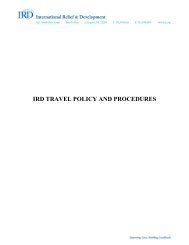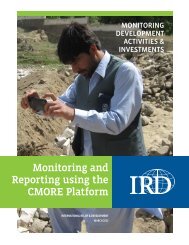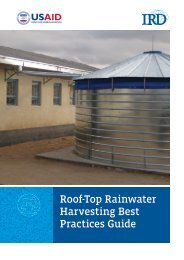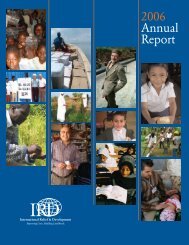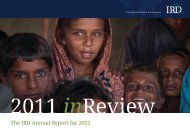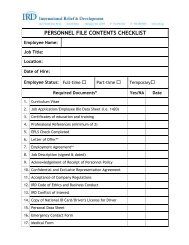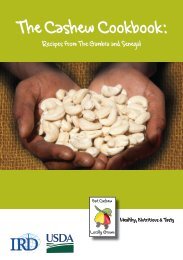Empowering citizens Engaging governments Rebuilding communities
Empowering citizens Engaging governments Rebuilding communities
Empowering citizens Engaging governments Rebuilding communities
You also want an ePaper? Increase the reach of your titles
YUMPU automatically turns print PDFs into web optimized ePapers that Google loves.
“<br />
The community believed in what we<br />
were doing and in our ability to help”<br />
—Iqbal al-Juboori<br />
1<br />
Building community trust<br />
supply equipment as long as the recipient maintained<br />
consistent production. “You have to learn to be a<br />
tailor,” she told the widow. “If you’re good, and if you<br />
learn, then we’re going to come back and monitor<br />
you, and we’re going to ask you how much you’re<br />
selling.” This process was an established part of the<br />
ICAP program. But a more immediate problem quickly<br />
became apparent—the house was so small, there<br />
was no place to put the equipment. “All I have is this<br />
house,” the widow said. “And it’s only one room. So<br />
where am I going to do this?”<br />
IRD had access to revenue-generating equipment, procedures<br />
in place to disburse grants, and a results-based<br />
system of accountability to maximize a beneficiary’s<br />
chance at success. If an issue required a programmatic<br />
solution, IRD had an answer. But overcoming the physical<br />
limitations of poverty and an overcrowded one-room<br />
house? That was another issue entirely. Still, IRD found<br />
a solution. Once the widow’s friends and neighbors<br />
learned of her plight, they got together and found a<br />
workspace to donate, provided IRD followed through with<br />
giving her the grant. “The community believed in what<br />
we were doing,” al-Juboori said, “and in our ability to<br />
help. She got the grant, and then she learned to sew.”<br />
The widow began selling coats, and over the course of<br />
the grants process, IRD workers delighted in watching<br />
her grow professionally and personally. “The first time<br />
she received actual money from one of her coats, she<br />
came to me, crying, and she hugged me,” al-Juboori<br />
said. “And she looked at me and said, ‘I’ve struggled for<br />
my whole life, and no one has ever helped me like this. I<br />
don’t feel alone anymore.’”<br />
ICAP: The first step to rebuilding civil society<br />
Often called the cradle of civilization, modern day Iraq<br />
is a country steeped in rich cultural and historical<br />
heritage. Ancient Mesopotamia gave rise to some of<br />
the world’s earliest cities, including Hatra, the capital<br />
of the first Arab kingdom, and it’s where agriculture<br />
was born. The region boasted accomplishments in the<br />
arts, agriculture, architecture, law, and medicine. But<br />
Iraq’s rich heritage proved of little value for much of<br />
the twentieth century, as political turbulence and war<br />
took a severe toll. After post-World War I British rule<br />
ended, 58 separate <strong>governments</strong> ruled Iraq over 37<br />
years, until a 1958 revolution overthrew the monarchy.<br />
1 After the Ba’ath party took power in a 1963 coup,<br />
a brief period of stability and prosperity produced a<br />
secular state with a thriving oil economy, a rising GDP,<br />
and a burgeoning education system. After Saddam<br />
Hussein seized power in 1979 and almost immediately<br />
launched a war with Iran, the country’s economic and<br />
social infrastructure began to deteriorate.<br />
In a short time, Iraq descended from affluence to a<br />
country in which the standard of living was reduced to<br />
a “subsistence level,” according to the UN’s Committee<br />
on Economic, Social and Cultural Rights. 2 As a closed<br />
society, Iraq’s GDP plunged by more than $50 billion<br />
in less than 10 years, food and agricultural production<br />
slowed, and 60 percent of the population depended on<br />
government rations. Malnutrition, a leading contributor<br />
to rising infant mortality rate, grew rampant. 3 Essential<br />
services slowed due to years of poor maintenance or<br />
outright neglect. Approximately half the population did<br />
not have regular access to potable drinking water, and<br />
even fewer households were connected to a functioning<br />
sewage system. Iraq was a failing state even before<br />
the Hussein government fell in March 2003.<br />
In April 2003, the Coalition Provisional Authority was<br />
established as a transitional government. One month<br />
later, USAID awarded cooperative agreements to five<br />
American NGOs to implement ICAP, a central element<br />
of USAID’s overall relief and reconstruction mission<br />
in Iraq. ICAP was conceived as a community action<br />
and mobilization initiative to foster civic pride in Iraqis<br />
and to try and reconnect them to an operational civil<br />
society (box 1). IRD, chosen to implement the program<br />
8


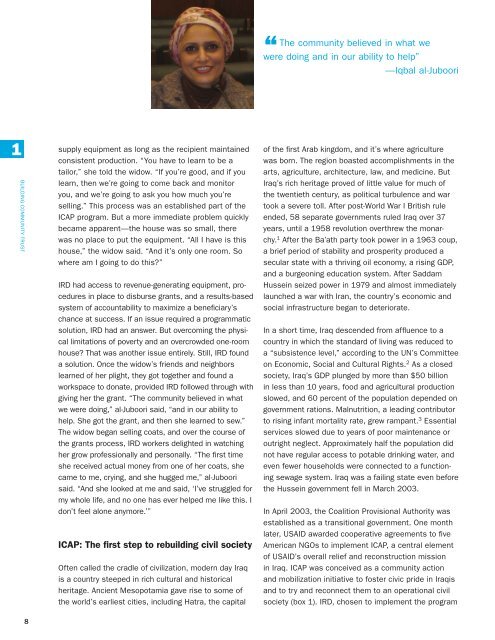
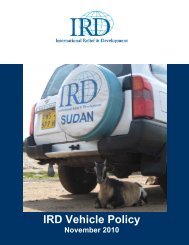
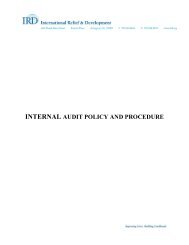
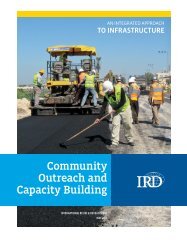
![Guide bonne pratique production d'oignon qualité_VF_4_2411012[1]](https://img.yumpu.com/23506639/1/184x260/guide-bonne-pratique-production-doignon-qualitac-vf-4-24110121.jpg?quality=85)
